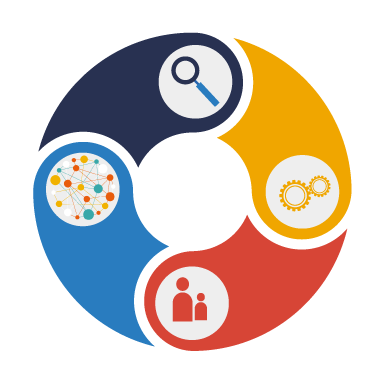Rare Diseases
Rare diseases are defined in Europe as diseases that afflict less than 1 in 2000 people. Although each rare disease is by definition rare, they together represent a large, heterogeneous group of approximately 6000 different diseases, which altogether afflict 350-400 million people worldwide and more than 30 million in Europe, and cause a major burden to human well-being and health systems.

As the symptoms of rare diseases are highly heterogeneous and their frequency is low, the proper diagnosis and treatment of these diseases is currently challenging. Indeed, it is estimated that over 90% of all rare diseases are currently without approved treatment. Furthermore, approximately 80% of rare diseases are genetic in origin, with many being caused by recessive genetic aberrations. However, the genetic basis of many of them is still poorly defined, making the investigation of their underlying pathogenic mechanisms difficult.
Because of these factors, many patients with rare diseases still lack accurate diagnosis and appropriate treatments with a negative impact on survival and on quality of life.
Such genetic rare diseases are the topic of RareBoost, which aims to establish IBG as a major hub for research, innovation and knowledge in rare diseases.
Rare Diseases In Turkey
It is estimated that almost 6 million people in Turkey are affected by a rare disease. Rare Diseases are an important public health problem in Turkey, as in almost every country.
Due to the difficulty in diagnosing Rare Diseases, there is a need for specialized physicians, clinical centers, and diagnostic laboratories. Drugs used in the treatment of rare diseases are often expensive due to the challenging, time-consuming, and costly nature of the research and development processes. In order to address the challenges faced by patients and their families, it is crucial to establish a reliable data collection and evaluation mechanism for rare diseases within the general healthcare system. Additionally, there is a need for the development of a national health policy on rare diseases and orphan drugs in our country.
There is currently no regulation defining Rare Diseases and orphan drugs in our country. Therefore, despite the presence of many experts working on Rare Diseases, the number of researchers reaching conclusive results in this field is significantly lower than needed. Hence, conducting studies to meet the needs in this regard is of great importance in Turkey.
Characteristics of Rare Diseases
Low prevalence
Rare Diseases are generally observed with low frequency in a specific population. In different countries, the definition of a Rare Disease may differ. For instance, in the USA, a disease is typically considered rare if it affects 200,000 or fewer people, whereas in the European Union and Turkey, rare diseases are defined as diseases that are observed 1 in 2000 people or less.
Genetic or Non-Genetic Origin
Approximately 80% of Rare Diseases are caused by genetic factors. The cause of 20% is either unknown or defined as environmental factors. Almost all genetic diseases are rare diseases; however, not all Rare Diseases are genetic diseases.
Challenges in Diagnosis and Treatment
Rare Diseases can often be challenging to diagnose because many healthcare professionals may not have encountered these diseases. This situation can complicate timely intervention for early diagnosis and effective treatment.
Chronic and Life-Threatening Nature
Many Rare Diseases can be chronic and life-threatening. The disease often significantly impacts a person’s quality of life and may lead to long-term health issues.
Wide range of signs and symptoms
Rare Diseases often exhibit a range of different symptoms and clinical signs. Even among individuals with the same disease, significant variations can occur.
Social and Psychological Effects
Rare Diseases can impact not only physical health but also social and psychological well-being. Individuals and their families living with these diseases often seek support and understanding.
Limited Treatment Options and Challenges in Drug Development
In addition to the limited number of treatment options for Rare Diseases, developing drugs for these diseases is often costly and challenging. Therefore, regulations and incentives that encourage research in this field are of great importance.
Orphan Drugs
Drugs required for the treatment of rare diseases are often referred to as “orphan drugs” since they specifically target a limited group of patients. Diseases affecting very few people in a country or region may not be financially attractive for pharmaceutical companies. Consequently, government-funded research, private sector incentives, or other financial encouragements may stimulate the development of drugs for these Rare Diseases. It is widely recognized that some pharmaceutical companies are turning towards orphan drug production with the aim of enhancing patients’ quality of life and prolong their life spans, driven by a sense of social responsibility. However, unfortunately, this effort is not yet at a sufficient level.
In our country, there is no designated orphan drug status in the laws. Orphan drugs are subject to the same licensing and reimbursement processes as other drugs. The majority of orphan drugs in Turkey are produced abroad. Orphan drugs that are not licensed in Turkey can be delivered to patients through the Turkish Pharmacists’ Association.
Medical and Social Impacts of Rare Diseases
There are both medical and scientific knowledge gaps in the field of Rare Diseases. Until recently, there was no comprehensive research or health policy on these issues, as physicians, scientists, and policymakers have long been unaware of Rare Diseases. For most Rare Diseases, there is no cure, but appropriate treatment and medical care can improve the quality of life and prolong life expectancy. Striking progress in some diseases indicates the need to continue efforts in research and social solidarity.
Almost all patients face difficulties not only due to the prolonged diagnostic process caused by the rarity of the disease but also in terms of being directed to knowledgeable and experienced specialists. Issues related to access to quality healthcare, social and medical support, effective communication among hospitals, and general practices are experienced.
Patients affected by Rare Diseases are also psychologically, socially, economically and culturally vulnerable. It is clear that with appropriate policies, these challenges can be overcome.
